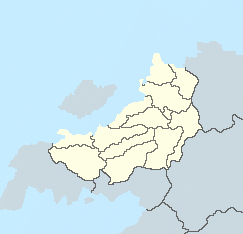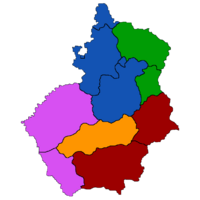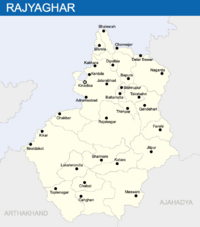Administrative divisions of Rajyaghar: Difference between revisions
mNo edit summary |
|||
| Line 6: | Line 6: | ||
| territory = [[Rajyaghar|Kingdom of Rajyaghar]] | | territory = [[Rajyaghar|Kingdom of Rajyaghar]] | ||
| start_date = | | start_date = | ||
| current_number = 24 Union States, | | current_number = 24 Union States, 2 Federal Territories | ||
| number_date = | | number_date = | ||
| government = {{wp|State government}} | | government = {{wp|State government}} | ||
| Line 12: | Line 12: | ||
}} | }} | ||
{{Politics of Rajyaghar}} | {{Politics of Rajyaghar}} | ||
The '''Union States and Federal Territories''' of [[Rajyaghar]] are the principal administrative divisions of the Kingdom. The Kingdom is a {{wp|federation}} of 6 National Regions split into 24 Union States and | The '''Union States and Federal Territories''' of [[Rajyaghar]] are the principal administrative divisions of the Kingdom. The Kingdom is a {{wp|federation}} of 6 National Regions split into 24 Union States and 2 Federal Territories. The Union States and Federal Territories are further subdivided into Provinces and Communes. | ||
[Brief history]. The administrative divisions are based on the historical [[Madhyarajyas|middle kingdoms]] of Rajyaghar with all of them retaining their royal families which serve as ceremonial representatives of the Monarch in the Union States and are granted the titles of ''"Rajakumar of the Union State"''. The Federal Districts are governed differently and have different ceremonial representatives of the Monarch. In [[Bishnupur]] it is the High Priest and in [[Kinadica]] it is the Governor. | [Brief history]. The administrative divisions are based on the historical [[Madhyarajyas|middle kingdoms]] of Rajyaghar with all of them retaining their royal families which serve as ceremonial representatives of the Monarch in the Union States and are granted the titles of ''"Rajakumar of the Union State"''. The Federal Districts are governed differently and have different ceremonial representatives of the Monarch. In [[Bishnupur]] it is the High Priest and in [[Kinadica]] it is the Governor. | ||
==History== | ==History== | ||
space filler - space filler - space filler - space filler - space filler - space filler - space filler - space filler - space filler - space filler - space filler - space filler - space filler - space filler - space filler - space filler - space filler - space filler - space filler - space filler - space filler - space filler - space filler - space filler - space filler - space filler - space filler - space filler - space filler - space filler - space filler - space filler - space filler - space filler - space filler - space filler - space filler - space filler - space filler - space filler - space filler - space filler - space filler - space filler - space filler - space filler - space filler - space filler - space filler - space filler - space filler - space filler - space filler - space filler - space filler - space filler - space filler - space filler - space filler - space filler - space filler - space filler - space filler - space filler - space filler - space filler - space filler - space filler - space filler - space filler - | |||
===Madhyarajyas=== | |||
space filler - space filler - space filler - space filler - space filler - space filler - space filler - space filler - space filler - space filler - space filler - space filler - space filler - space filler - space filler - space filler - space filler - space filler - space filler - space filler - space filler - space filler - space filler - space filler - space filler - space filler - space filler - space filler - space filler - space filler - space filler - space filler - space filler - space filler - space filler - space filler - space filler - space filler - space filler - space filler - space filler - space filler - space filler - space filler - space filler - space filler - space filler - space filler - space filler - space filler - space filler - space filler - space filler - space filler - space filler - space filler - space filler - space filler - space filler - space filler - space filler - space filler - space filler - space filler - space filler - space filler - space filler - space filler - space filler - space filler - | |||
===Naratha Confederacy=== | ===Naratha Confederacy=== | ||
space filler - space filler - space filler - space filler - space filler - space filler - space filler - space filler - space filler - space filler - space filler - space filler - space filler - space filler - space filler - space filler - space filler - space filler - space filler - space filler - space filler - space filler - space filler - space filler - space filler - space filler - space filler - space filler - space filler - space filler - space filler - space filler - space filler - space filler - space filler - space filler - space filler - space filler - space filler - space filler - space filler - space filler - space filler - space filler - space filler - space filler - space filler - space filler - space filler - space filler - space filler - space filler - space filler - space filler - space filler - space filler - space filler - space filler - space filler - space filler - space filler - space filler - space filler - space filler - space filler - space filler - space filler - space filler - space filler - space filler - | |||
===Colonial Era=== | ===Colonial Era=== | ||
space filler - space filler - space filler - space filler - space filler - space filler - space filler - space filler - space filler - space filler - space filler - space filler - space filler - space filler - space filler - space filler - space filler - space filler - space filler - space filler - space filler - space filler - space filler - space filler - space filler - space filler - space filler - space filler - space filler - space filler - space filler - space filler - space filler - space filler - space filler - space filler - space filler - space filler - space filler - space filler - space filler - space filler - space filler - space filler - space filler - space filler - space filler - space filler - space filler - space filler - space filler - space filler - space filler - space filler - space filler - space filler - space filler - space filler - space filler - space filler - space filler - space filler - space filler - space filler - space filler - space filler - space filler - space filler - space filler - space filler - | |||
==Union States and Federal Territories== | ==Union States and Federal Territories== | ||
| Line 27: | Line 37: | ||
[[File: RajyagharLocation.png|200px|right|thumb|Major Cities]] | [[File: RajyagharLocation.png|200px|right|thumb|Major Cities]] | ||
===National Regions=== | ===National Regions=== | ||
{{div col|colwidth=10em}} | There are 6 National Regions in the Kingdom of Rajyaghar, which consist of multiple Union States and Federal Territories. The 6 Regions are:{{div col|colwidth=10em}} | ||
* {{flagicon image|RajyagharFlag.png}} The Core | * {{flagicon image|RajyagharFlag.png}} The Core | ||
* {{flagicon image|RajyagharFlag.png}} The North | * {{flagicon image|RajyagharFlag.png}} The North | ||
* {{flagicon image|RajyagharFlag.png}} Eastern Bloc | * {{flagicon image|RajyagharFlag.png}} Eastern Bloc | ||
* {{flagicon image|RajyagharFlag.png}} Lowlands | * {{flagicon image|RajyagharFlag.png}} The Lowlands | ||
* {{flagicon image|RajyagharFlag.png}} Pavitra | * {{flagicon image|RajyagharFlag.png}} Pavitra | ||
* {{flagicon image|RajyagharFlag.png}} Outer Rim | * {{flagicon image|RajyagharFlag.png}} Outer Rim | ||
| Line 37: | Line 47: | ||
===Union States=== | ===Union States=== | ||
There are 24 Union States in the Kingdom of Rajyaghar: | |||
{{div col|colwidth=10em}} | {{div col|colwidth=10em}} | ||
* {{flagicon image|RajyagharFlag.png}} [[Bhankari]] | * {{flagicon image|RajyagharFlag.png}} [[Bhankari]] | ||
| Line 45: | Line 56: | ||
* {{flagicon image|HarringhataFlag.png}} [[Harringhata]] | * {{flagicon image|HarringhataFlag.png}} [[Harringhata]] | ||
* {{flagicon image|RajyagharFlag.png}} [[Jhanaghar]] | * {{flagicon image|RajyagharFlag.png}} [[Jhanaghar]] | ||
* {{flagicon image|RajyagharFlag.png}} [[Kendra Pradesh]] | |||
* {{flagicon image|RajyagharFlag.png}} [[Kodur]] | * {{flagicon image|RajyagharFlag.png}} [[Kodur]] | ||
* {{flagicon image|LakhanaFlag.png}} [[Lakhana]] | * {{flagicon image|LakhanaFlag.png}} [[Lakhana]] | ||
| Line 64: | Line 76: | ||
===Federal Districts=== | ===Federal Districts=== | ||
{{div col|colwidth= | There are 2 Federal Territories in the Kingdom of Rajyaghar: | ||
{{div col|colwidth=10em}} | |||
* {{flagicon image|BishnupurFlag.png}} [[Bishnupur]] | * {{flagicon image|BishnupurFlag.png}} [[Bishnupur]] | ||
* {{flagicon image|KinadicaFlag.png}} [[Kinadica]] | * {{flagicon image|KinadicaFlag.png}} [[Kinadica]] | ||
{{div col end}} | {{div col end}} | ||
==Regional Governance== | |||
[[File: Admiral Verma.jpg|150px|right|thumb|Governor of the Core]] | |||
National Regions are collections of Union States and Federal Territories. Governance of the regions is performed by a Governor who is supported by the Ayog (Commission). The Governor is tasked with overseeing the governments of Union States and Federal Territories and acting as a liaison between them and the Central Union Government. Governors are predominantly have a ceremonial and advisory role, with their main powers, {{wp|reserve powers}} only exercised in times of crises. | |||
In times of crisis, the Monarch may, at the request of the [[Premier of Rajyaghar|Premier]], invoke Article X of the Constitution which grants the Governors extensive power to suspend Union State and Federal District governments and directly administer rule over their region. Article X has only ever been invoked for the Outer Rim region. Due to this emergency function, Governors are typically experienced former administrators such as former First Ministers, Ministers of the Crown, Military Commanders or minor Royals. | |||
Governors are appointed for 7 year terms, twice renewable, by the Monarch on the advice of the Premier and the Rajkumar Parishad (Council of Princes) for that region. Governors can only be removed by the Monarch but the Prince(ss)es of the Union States may petition the Monarch for a Governor's early dismissal. Governors are required to be non-partisan. | |||
==State Governance== | ==State Governance== | ||
| Line 73: | Line 94: | ||
Governance of the Union States is divided between the [[Central Union Government|federal]] and state governments. Each Union State has a legislature which, depending on the state, will either be {{wp|unicameral}} or {{wp|bicameral}}. In the majority of cases, the larger states have bicameral legislatures with the upper house having provincial representatives and the lower house having communal representatives. Following the {{wp|Westminster System|Northabbey model}}, the State Governments are led by First Ministers, who are members of the state legislature from the majority party. State elections are held every 5 years which, since 1995, have been at the same time as federal elections. | Governance of the Union States is divided between the [[Central Union Government|federal]] and state governments. Each Union State has a legislature which, depending on the state, will either be {{wp|unicameral}} or {{wp|bicameral}}. In the majority of cases, the larger states have bicameral legislatures with the upper house having provincial representatives and the lower house having communal representatives. Following the {{wp|Westminster System|Northabbey model}}, the State Governments are led by First Ministers, who are members of the state legislature from the majority party. State elections are held every 5 years which, since 1995, have been at the same time as federal elections. | ||
=== | ===Provincial and Communal Governance=== | ||
Governance related to lower-level administration is further devolved from state governments to local authorities | Governance related to lower-level administration is further devolved from state governments to local authorities; the Provincial and Communal Councils. Whilst state governments hold jurisdiction over local authorities, the federal government can request the Monarch to invoke Article X of the Constitution, granting the Governor the right to intervene and potentially suspend the State Government. | ||
The federal constitution outlines the following duties to be exercised by the state governments: | The federal constitution outlines the following duties to be exercised by the state governments: | ||
| Line 84: | Line 105: | ||
* Any other duty not prescribed by law to be under the jurisdiction of the federal government | * Any other duty not prescribed by law to be under the jurisdiction of the federal government | ||
Since independence, the federal government has slowly reduced the powers granted to the state governments through legislating over previously un-prescribed duties, which combined with lack of development and federal intervention in state affairs, has led to increasing popularity of secession movements in the states of [[Tarkhana]], [[Sasipur]] and [[Pinjar]]. During ''the Emergency'', the | Since independence, the federal government has slowly reduced the powers granted to the state governments through legislating over previously un-prescribed duties, which combined with lack of development and federal intervention in state affairs, has led to increasing popularity of secession movements in the states of [[Tarkhana]], [[Sasipur]] and [[Pinjar]]. During ''the Emergency'', the 12th Amendment was transferred jurisdiction of the police from state governments to the federal government. | ||
{{Rajyaghar}} | {{Rajyaghar}} | ||
Revision as of 21:26, 20 April 2021
This article is incomplete because it is pending further input from participants, or it is a work-in-progress by one author. Please comment on this article's talk page to share your input, comments and questions. Note: To contribute to this article, you may need to seek help from the author(s) of this page. |
| Union States and Territories of Rajyaghar | |
|---|---|
 | |
| Category | Federated state |
| Location | Kingdom of Rajyaghar |
| Number | 24 Union States, 2 Federal Territories |
| Government | State government |
| Subdivisions | Province, Commune |
 |
|---|
| This article is part of a series on the politics and government of Rajyaghar |
The Union States and Federal Territories of Rajyaghar are the principal administrative divisions of the Kingdom. The Kingdom is a federation of 6 National Regions split into 24 Union States and 2 Federal Territories. The Union States and Federal Territories are further subdivided into Provinces and Communes.
[Brief history]. The administrative divisions are based on the historical middle kingdoms of Rajyaghar with all of them retaining their royal families which serve as ceremonial representatives of the Monarch in the Union States and are granted the titles of "Rajakumar of the Union State". The Federal Districts are governed differently and have different ceremonial representatives of the Monarch. In Bishnupur it is the High Priest and in Kinadica it is the Governor.
History
space filler - space filler - space filler - space filler - space filler - space filler - space filler - space filler - space filler - space filler - space filler - space filler - space filler - space filler - space filler - space filler - space filler - space filler - space filler - space filler - space filler - space filler - space filler - space filler - space filler - space filler - space filler - space filler - space filler - space filler - space filler - space filler - space filler - space filler - space filler - space filler - space filler - space filler - space filler - space filler - space filler - space filler - space filler - space filler - space filler - space filler - space filler - space filler - space filler - space filler - space filler - space filler - space filler - space filler - space filler - space filler - space filler - space filler - space filler - space filler - space filler - space filler - space filler - space filler - space filler - space filler - space filler - space filler - space filler - space filler -
Madhyarajyas
space filler - space filler - space filler - space filler - space filler - space filler - space filler - space filler - space filler - space filler - space filler - space filler - space filler - space filler - space filler - space filler - space filler - space filler - space filler - space filler - space filler - space filler - space filler - space filler - space filler - space filler - space filler - space filler - space filler - space filler - space filler - space filler - space filler - space filler - space filler - space filler - space filler - space filler - space filler - space filler - space filler - space filler - space filler - space filler - space filler - space filler - space filler - space filler - space filler - space filler - space filler - space filler - space filler - space filler - space filler - space filler - space filler - space filler - space filler - space filler - space filler - space filler - space filler - space filler - space filler - space filler - space filler - space filler - space filler - space filler -
Naratha Confederacy
space filler - space filler - space filler - space filler - space filler - space filler - space filler - space filler - space filler - space filler - space filler - space filler - space filler - space filler - space filler - space filler - space filler - space filler - space filler - space filler - space filler - space filler - space filler - space filler - space filler - space filler - space filler - space filler - space filler - space filler - space filler - space filler - space filler - space filler - space filler - space filler - space filler - space filler - space filler - space filler - space filler - space filler - space filler - space filler - space filler - space filler - space filler - space filler - space filler - space filler - space filler - space filler - space filler - space filler - space filler - space filler - space filler - space filler - space filler - space filler - space filler - space filler - space filler - space filler - space filler - space filler - space filler - space filler - space filler - space filler -
Colonial Era
space filler - space filler - space filler - space filler - space filler - space filler - space filler - space filler - space filler - space filler - space filler - space filler - space filler - space filler - space filler - space filler - space filler - space filler - space filler - space filler - space filler - space filler - space filler - space filler - space filler - space filler - space filler - space filler - space filler - space filler - space filler - space filler - space filler - space filler - space filler - space filler - space filler - space filler - space filler - space filler - space filler - space filler - space filler - space filler - space filler - space filler - space filler - space filler - space filler - space filler - space filler - space filler - space filler - space filler - space filler - space filler - space filler - space filler - space filler - space filler - space filler - space filler - space filler - space filler - space filler - space filler - space filler - space filler - space filler - space filler -
Union States and Federal Territories

National Regions
There are 6 National Regions in the Kingdom of Rajyaghar, which consist of multiple Union States and Federal Territories. The 6 Regions are:
 The Core
The Core The North
The North Eastern Bloc
Eastern Bloc The Lowlands
The Lowlands Pavitra
Pavitra Outer Rim
Outer Rim
Union States
There are 24 Union States in the Kingdom of Rajyaghar:
Federal Districts
There are 2 Federal Territories in the Kingdom of Rajyaghar:
Regional Governance
National Regions are collections of Union States and Federal Territories. Governance of the regions is performed by a Governor who is supported by the Ayog (Commission). The Governor is tasked with overseeing the governments of Union States and Federal Territories and acting as a liaison between them and the Central Union Government. Governors are predominantly have a ceremonial and advisory role, with their main powers, reserve powers only exercised in times of crises.
In times of crisis, the Monarch may, at the request of the Premier, invoke Article X of the Constitution which grants the Governors extensive power to suspend Union State and Federal District governments and directly administer rule over their region. Article X has only ever been invoked for the Outer Rim region. Due to this emergency function, Governors are typically experienced former administrators such as former First Ministers, Ministers of the Crown, Military Commanders or minor Royals.
Governors are appointed for 7 year terms, twice renewable, by the Monarch on the advice of the Premier and the Rajkumar Parishad (Council of Princes) for that region. Governors can only be removed by the Monarch but the Prince(ss)es of the Union States may petition the Monarch for a Governor's early dismissal. Governors are required to be non-partisan.
State Governance
Governance of the Union States is divided between the federal and state governments. Each Union State has a legislature which, depending on the state, will either be unicameral or bicameral. In the majority of cases, the larger states have bicameral legislatures with the upper house having provincial representatives and the lower house having communal representatives. Following the Northabbey model, the State Governments are led by First Ministers, who are members of the state legislature from the majority party. State elections are held every 5 years which, since 1995, have been at the same time as federal elections.
Provincial and Communal Governance
Governance related to lower-level administration is further devolved from state governments to local authorities; the Provincial and Communal Councils. Whilst state governments hold jurisdiction over local authorities, the federal government can request the Monarch to invoke Article X of the Constitution, granting the Governor the right to intervene and potentially suspend the State Government.
The federal constitution outlines the following duties to be exercised by the state governments:
- Management of transportation and local infrastructure
- Provision of emergency services (excluding the police since 1965)
- Local planning and zoning
- Education outside of the national curriculum
- Any other duty not prescribed by law to be under the jurisdiction of the federal government
Since independence, the federal government has slowly reduced the powers granted to the state governments through legislating over previously un-prescribed duties, which combined with lack of development and federal intervention in state affairs, has led to increasing popularity of secession movements in the states of Tarkhana, Sasipur and Pinjar. During the Emergency, the 12th Amendment was transferred jurisdiction of the police from state governments to the federal government.


